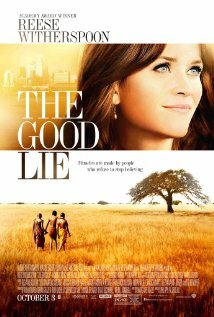
Twice over the weekend, people told me that I should see The Good Lie, a 2014 movie starring Reese Witherspoon about some of the lost boys of Sudan – children who fled Sudan as refugees without either parent.
As someone who's stood in a refugee camp in Rwanda and been actively involved in refugee ministry here in the United States for the last decade, I enjoyed the movie. I laughed knowingly at some of the humorous parts of the resettlement process depicted in the movie, like the moment when, just prior to boarding the plane that will take them out of the refugee camp to their new life in America, Abital looks at her brother's “Just do it” t-shirt with the Nike swirl and says, “Maybe we'll finally learn what this means”. I cried when, upon arriving at JFK in the United States, Abital is separated from her brothers because no host family in Missouri will take her and some bureaucrat has decided it's inappropriate for female refugees to live with their brothers. I also greatly appreciated the fact that this movie showcases both the terror-filled flight of refugees from their homeland and the difficulties of resettlement they face. Moreover, I appreciated the accuracy with which this movie depicts a refugee's journey.
To be sure, The Good Lie is a movie that will help educate people about the plight of refugees. However, as I watched it, I couldn't help but wonder, why is it it that this is yet another depiction of the lost boys of Sudan? Why does this seem to be the only refugee group that warrants movies and books?
Indeed, The Good Lie is not the only movie that's been done about the lost boys of Sudan. There's also God Grew Tired Of Us. Numerous books have also been penned about this population including Dave Eggers' brilliant What is the What and Benjamin Ajak and Benson Deng's, They Poured Fire on Us From the Sky: The True Story of Three Lost Boys from Sudan.
In many ways, the lost boys of Sudan have become the poster children for refugees.
In a way, that's good.
After all, their story brings awareness to the plight of refugees everywhere.
Right?
If only that were actually the case.
Unfortunately, I've talked to far too many people unable to generalize the story of the Lost Boys to refugees elsewhere. To so many people, there's the lost boys of Sudan and then there's the scary refugees from everywhere else who might actually be terrorists.
In actuality, though, the story of the lost boys of Sudan is far more universal than people realize.
Like the lost boys of Sudan, the story of refugees everywhere begins with terror, with war or persecution that forces them to flee their homeland, fearing for their lives.
Like the lost boys of Sudan, most refugees flee their homelands on foot, walking miles until they reach a refugee camp in a neighboring country that's safe – or at least safer than the country they've fled.
Like the lost boys of Sudan, most refugees spend YEARS in a refugee camp before it's either safe for them to return home or they're able to be resettled elsewhere. In fact, many refugees spend far longer than the lost boys of Sudan did in refugee camps.
Like the lost boys of Sudan, most refugees find resettlement extremely difficult. Most have no say in where they're going. They arrive as strangers in a completely foreign country, often not speaking the language.
Like the lost boys of Sudan, surprisingly few refugees default on the money loaned to them for the plane tickets that brought them to the country where they're resettled.
Like the lost boys of Sudan, most refugees work incredibly hard at menial jobs, regardless of how advanced their education was in their homeland. They're determined to support their families, go to school, and live the American dream.
The lost boys of Sudan are certainly not the only refugees who have succeeded in the United States. The same is also true of refugees from Rwanda, Burundi, the Congo, Eritrea, Myanmar, Bhutan, Iraq, Iran, Syria, and countless other places. So why aren't we also telling their stories?
My prayer is that one day we will.
May we have eyes to see and ears to hear the stories of all refugees – regardless of where they're from. May we also have the courage to tell their stories so that one day, we'll be a country and a people who welcomes refugees from around the world – knowing that their stories are both the same and different as those of the lost boys of Sudan.